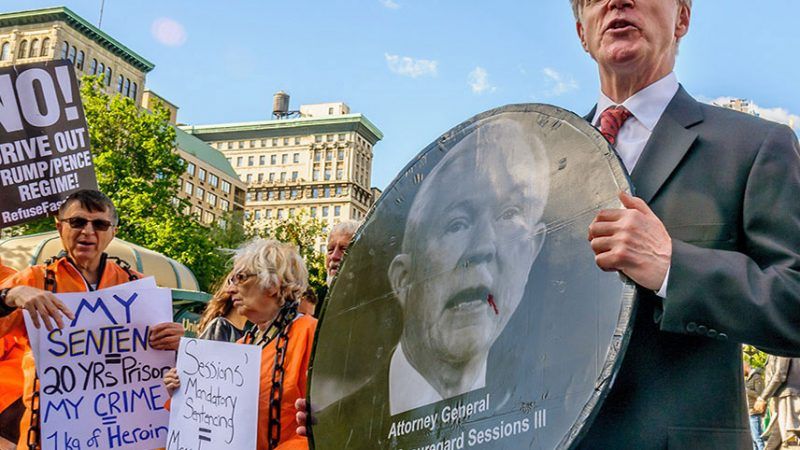Jeff Sessions, Glutton for Punishment

Eric Holder, who as Barack Obama's attorney general declared that "too many Americans go to too many prisons for far too long," encouraged federal prosecutors to be more judicious in bringing drug charges that carry mandatory minimum sentences. Jeff Sessions, who faults the previous administration for not locking up enough Americans, was quick to rescind Holder's policy after Donald Trump appointed him to run the Department of Justice (DOJ). If prosecutors follow his lead, more drug offenders will be facing long stretches in federal prison.
In a 2010 memo, Holder emphasized the importance of "individualized assessment" in deciding how to charge defendants. Three years later, he went further, telling prosecutors they should omit drug weight, which is what triggers mandatory minimums, from charges against nonviolent drug offenders without leadership roles, significant criminal histories, or significant ties to large-scale drug trafficking organizations.
A recent survey of assistant U.S. attorneys by the DOJ's inspector general found that nearly half said they had changed their charging practices in response to Holder's directives. From fiscal year 2010 to fiscal year 2016, according to the U.S. Sentencing Commission, the share of federal defendants convicted of crimes carrying mandatory minimums fell by nearly a fifth, from 27 percent to 22 percent.
The makeup of that group also changed during this period. Drug trafficking defendants facing mandatory minimums in FY 2016 were more likely to be violent, to have significant criminal histories, and to have played high-level roles—all factors that would have disqualified them from the prosecutorial forbearance urged by Holder. These trends suggest that prosecutors became more discriminating in their use of mandatory minimums, feeding a decline in the federal prison population that began in 2014 after more than three decades of steady growth.
Sessions, who argues that low-level, nonviolent offenders are essentially nonexistent in the federal system, wants prosecutors to be less discriminating. In a May 10 memo reversing Holder's policy, he allowed for the possibility of leniency in extraordinary cases but said such decisions would have to be justified in writing and approved by supervisors. Sessions is trying to establish a strong presumption in favor of bringing the most serious provable charge, leaving little room for individualized assessment.
"The tone/attitude of DOJ ultimately matters even more than the particulars of the memo," says Douglas Berman, a sentencing expert at The Ohio State University Moritz College of Law. "Things got a lot more lenient during Obama's second term.…Things are likely to get tougher during Trump's first term, but how much tougher is going to depend on whether others formally and informally jump on the toughness bandwagon."
This article originally appeared in print under the headline "Jeff Sessions, Glutton for Punishment."


Show Comments (1)